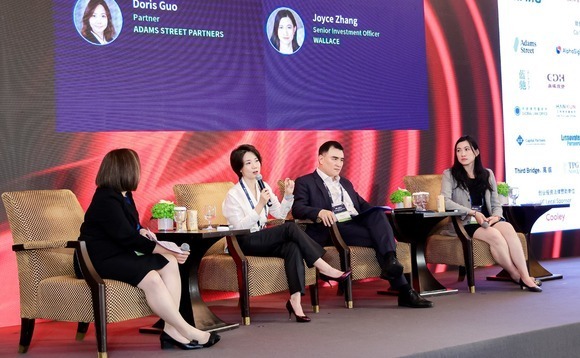
LPs call for discipline on valuations, exits from China GPs - AVCJ Forum

Some LPs have increased their return expectations for Chinese private equity, and they are calling on local managers to be more disciplined on entry valuations and more tenacious on exits in the hope that these higher thresholds can be met.
"We are seeking higher returns from China because of the higher risk premium," Doris Guo, a partner at fund-of-funds Adams Street Partners, told the AVCJ Private Equity & Venture Forum China 2023.
"Fewer people will be able to generate those returns and some sectors will be more promising than others. We must be mindful of that, so we are leaning into sectors that make governments everywhere happy. We would like to see quicker DPIs [distributions to paid-in] or managers who are more proactive in generating exits."
Ronald Liu, a China-based managing director at Singapore's Temasek Holdings, stressed the importance of value creation-oriented portfolio management and plotting multiple potential paths to exit so that managers "can generate a higher DPI instead of the traditional IRR based on unrealised returns."
Liu also advocated for greater selectivity in the sourcing process and adherence to internal protocols on deal execution and valuations.
Guo made similar observations on valuations but extended the point about discipline to include fund size as well. A smaller pool of capital means managers will likely pursue fewer deals and be wary of paying up for assets – which can lead to better exit outcomes. Moreover, additional percentage points of return can be extracted by focusing on the fine details.
"In the past, GPs could be less sophisticated in managing cash flow, operations, and investment cost, leading to a larger gross-net spread in the return," Guo added. "In this environment, they should enhance that, so even if the gross IRR is similar or less than before, the net IRR is better."
Adams Street and Temasek, like many LPs, are caught between short-term and long-term assessments of China. Issues such as geopolitical tensions and a slower-than-expected economic recovery discourage immediate action, but they remain convinced by China's fundamentals: deepening talent pools, a growing middle class, robust entrepreneurship, and products are increasingly globally competitive.
"We invest in opportunities driven by structural trends – digitalisation, longer life spans, sustainable living, and the future consumer," said Liu. "We can partner with leading GPs and invest in these opportunities."
Talent was one of the key takeaways for Joyce Zhang, a senior investment officer at the US-based Wallace Foundation, from a trip spent researching "China plus one" concepts in other markets. She was convinced there is "no country that compares to China in terms of talent pool, in terms of innovation," and this is one of the reasons why Wallace expects the market to deliver in the long term.
Commitments to US dollar-denominated China funds reached approximately USD 21bn in 2021 and 2022, but they stand at just USD 6.1bn year-to-date. A collapse in interest among US investors – because they are overallocated to private equity, are in risk-off mode, or are put off by the political sensitivities around China – is a key factor. Wallace, however, is not backing away.
The endowment's 5% allocation to China is relatively low compared to most of its peer group, and keen to meet more GPs. But Zhang admitted that current perceptions of China in the US are challenging for LPs.
"Momentum has shifted because investors fear geopolitical tensions. Every day, when you open the Wall Street Journal, it says China has taken away whatever or the real estate market has crashed. It's all negative," she said. "China is the new Japan from the 1990s, and that's something we cannot change."
Wallace tends to back smaller managers and prefers generalists over sector specialists. This is in part a function of necessity. The team is small and far removed, which makes it difficult to underwrite opportunities on the ground. Adams Street does back specialists but is wary of the regulatory risks that come with heavy exposure to a single sector, while Temasek is considering specialists selectively.
"We usually invest in a lot of generalist funds, but now we are looking for GPs with expertise in certain sub-sectors, so they can share deep insights on emerging technologies," Liu said. Regardless, Temasek tends to back managers in their third or fourth vintages because, by this point, teams have experienced different cycles and can position assets accordingly.
One helpful byproduct of the slowdown in fundraising is that seasoned and successful Chinese GPs are easier to access. Zhang recalled "a lot of efforts to kiss the ring" that weren't enough even to persuade a top manager to come out for coffee.
"We didn't underwrite China before 2020 because we couldn't get quality time with the managers and we couldn't get hold of the partners to build connections, build conviction," she said.
Latest News
Asian GPs slow implementation of ESG policies - survey
Asia-based private equity firms are assigning more dedicated resources to environment, social, and governance (ESG) programmes, but policy changes have slowed in the past 12 months, in part due to concerns raised internally and by LPs, according to a...
Singapore fintech start-up LXA gets $10m seed round
New Enterprise Associates (NEA) has led a USD 10m seed round for Singapore’s LXA, a financial technology start-up launched by a former Asia senior executive at The Blackstone Group.
India's InCred announces $60m round, claims unicorn status
Indian non-bank lender InCred Financial Services said it has received INR 5bn (USD 60m) at a valuation of at least USD 1bn from unnamed investors including “a global private equity fund.”
Insight leads $50m round for Australia's Roller
Insight Partners has led a USD 50m round for Australia’s Roller, a venue management software provider specializing in family fun parks.








